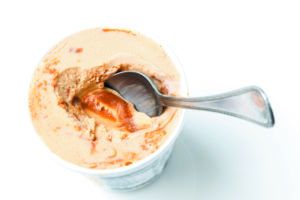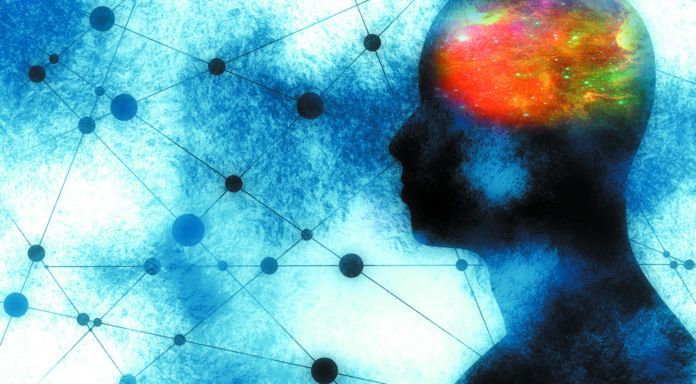Does stress impact our food choices? Conversely, can dietary choices help us better manage stress? “These are important questions, but difficult to answer,” says Robin Kanarek, PhD, emerita professor of psychology at Tufts.
Stress and Your Body: Physiologically, stress activates two main pathways in the body. The first is the “fight-or-flight” response of the sympathetic nervous system. When the body is under threat, the adrenal glands release epinephrine (also called adrenaline) and norepinephrine—hormones that help the body direct energy toward surviving imminent danger. “When, for example, you are attacked by a bear, you don’t need to digest, you need run away,” says Grace Giles, PhD, an adjunct instructor at the Friedman School and cognitive scientist with the U.S. Army Combat Capabilities Development Command Soldier Center. “The sympathetic pathway shifts all energy use to critical systems. The result is an increase in things like heart rate, and a decrease in less immediately essential functions like hunger.”
Shortly after the sympathetic nervous system snaps into action, the second pathway is stimulated. Known as the hypothalamic-pituitary-adrenal (HPA) axis, this hormonal cascade triggers release of the hormone cortisol. Cortisol increases blood pressure and cardiac output to send more blood to muscles and raises glucose levels (blood sugar) to provide a ready energy source. “While the sympathetic nervous system’s response to stress leads to a decrease in appetite, a rise in cortisol levels is associated with an increase in appetite,” says Giles. “Stress increases appetite in some people and decreases appetite in others. There are definitely individual responses to stress regarding desire to eat.”
“How stress impacts eating behavior depends on a number of factors,” says Kanarek. “Different types of stress (acute or chronic; physical or psychological) affect the body differently. Psychological factors (such as a history of stress-induced eating) and environmental factors (such as what foods are available) are involved as well.”
Emotional Eating: Many people report turning to food in times of stress. Research indicates the foods that provide some feeling of well-being when consumed (comfort foods) vary from person to person. While comfort foods are often associated with childhood memories, surveys indicate many common choices are high in carbohydrates (particularly sugars). Physiologically, cravings for sweets in times of stress could be part of the body’s efforts to mobilize energy for “fight or flight.” It has also been suggested that carbohydrate intake boosts production of serotonin, a neurotransmitter sometimes called the “feel good” chemical. But experimental studies indicate that stress and other negative emotions do not reliably lead to increased eating of sweets—or to increased eating at all.
In a review published recently in Current Directions in Psychological Science, graduate student Gizem Altheimer and professor of psychology and founder of the Emotion, Brain, and Behavior Laboratory at Tufts, Heather L. Urry, PhD, argue that emotional eating may, in part, be a learned behavior. Additionally, they suggest people may only turn to food in response to specific emotions, and whether eating behavior changes in response to stress may depend on social context (people might not eat the same way when they know they are being observed in a lab setting as they would in their daily lives, for example). These factors further complicate the study of the complex intersection between stress and eating behavior.
Whether for physiological or psychological reasons, in some people certain foods do boost mood or help with relaxation (think about sipping a cup of warm chamomile tea, savoring a square of dark chocolate, or indulging in a small portion of a childhood favorite).

and availability.
Image © Juanmonino | Getty Images
Stress, Diet, and Your Health: When stress is acute (like that bear attack), the body returns to its normal state when the threat has passed. Chronic stress, however, may have a significant impact on health. Prolonged high cortisol levels have been associated with weight gain (particularly in the midsection), insulin resistance, disordered cholesterol levels, and elevated blood sugar, blood pressure, and triglycerides levels. Chronic stress therefore increases risk for obesity, type 2 diabetes, and cardiovascular disease. It may also suppress the immune system. Counteracting stress, therefore, is essential to maintaining overall health.
The internet is full of articles promoting specific nutrients and foods to help manage stress. Complex carbohydrates like whole grains; omega-3 fatty acids in foods like salmon and avocados; vitamin C from citrus, red bell peppers, and strawberries; and magnesium from nuts, beans, and other plant foods are just some of the nutrients and foods that are promoted to relieve stress and anxiety and increase feelings of calm. Unfortunately, the evidence behind these assertions is weak. “In healthy individuals, effects of individual nutrients on stress appear to be fairly small,” says Giles. “To be fair, these effects are really difficult to study. It’s hard to induce a relevant level of stress in a lab setting in an ethical way.” Results of existing studies vary, so it is inappropriate to draw definitive conclusions. “Most of the studies looking at the impact of foods or supplements on stress have been small,” says Giles. “Additionally, studies have not been consistent in the way they administered foods or supplements, and researchers have not all used the same methods for measuring change in emotional state. These factors add to inconsistencies in results.”
While the jury is still out on individual nutrients and specific foods, diet is clearly an important factor in helping our bodies deal with physical and emotional stressors. An overall healthy dietary pattern may help counter the negative health impacts of chronic stress. Diet is essential in controlling weight, blood pressure, and cholesterol and triglyceride levels. It is also important to blood sugar control and supports a healthy immune system.
“As for many health-related issues, following a Mediterranean-style dietary pattern may be a good idea,” says Kanarek. This pattern (and other similar ways of building a healthy diet, like DASH or the U.S. Healthy Eating Pattern detailed in the Dietary Guidelines for Americans) emphasizes plant foods (fruits, nuts/seeds, vegetables, beans, whole grains, and non-tropical plant oils like olive oil) along with seafood, yogurt, and other lean proteins, and limits highly processed foods, saturated fats, refined carbohydrates, added sugars, and high-sodium foods. A dietary pattern like this is not only strongly associated with increased cardiometabolic health, it also contains plenty of all the potentially stress-busting nutrients and foods mentioned above.
Emerging research points to another way in which a healthy dietary pattern could be influential in managing stress. “The gut microbiome and its connection to the brain is a big area of research at this time,” says Giles. “There is some evidence that stress exerts bi-directional effects between the gastrointestinal nervous system and central nervous system. In other words, stress could have negative effects on beneficial gut bacteria, and positive changes to the gut microbiome could have emotional benefits, such as a decrease in depression and anxiety.”

Image © Mykyta Dolmatov | Getty Images
Consuming probiotic foods (those with live microorganisms, like many yogurts) supports a healthy gut microbiome. “Research on probiotics and stress holds promise,” says Giles, “at least in cases of short-term, mild stress.” Prebiotics—foods that feed gut microbes—are promising as well. “Things like fiber and polyphenols in fruits and vegetables enhance the gut microbiome and have the potential to decrease stress through that bi-directional pathway,” says Giles. “Just eating a healthy diet can increase beneficial bacteria. This in itself could benefit multiple pathways of health, including emotion. Consuming a generally healthy diet has no downside.”
“Making positive behavior changes regarding diet can also make a psychological contribution to stress reduction,” says Alice H. Lichtenstein, DSc, Stanley N. Gershoff Professor of Nutrition Science and Policy at the Friedman School and executive editor of Tufts Health & Nutrition Letter. “Making changes to improve the quality of one’s diet provides an opportunity to have some level of control in times where we may feel much is not in our control. That in itself can be very rewarding and lower stress levels.”
If you decide to make dietary changes, be careful they don’t add to your stress. “Worrying too much about exactly what foods are being eaten is probably not productive,” says Kanarek. “With so many health-related concerns these days, modifying ones feeding behavior may need to take a back seat to washing hands, wearing masks, social distancing, and all the other stressors that have recently increased in our lives.”
Try these tips to help protect health in stressful times:
- Follow a healthy dietary pattern that emphasizes fruits, nuts/seeds, vegetables, legumes, and whole grains; includes, fish/seafood and yogurt; and limits refined grains and starches, added sugars, saturated fats, and excessive sodium
- Be aware that research is unclear and conflicting on the value of individual nutrients or foods for combatting stress
- Be selective about which “comfort foods” are readily available
- Take comfort from “comfort foods” when necessary, but keep portions small if these are not healthy choices
- Don’t allow food choices to become a source of additional stress
- Be physically active; try yoga, meditation, or deep breathing; and don’t hesitate to seek help when feeling overwhelmed





















